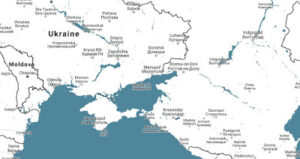 According to the acting governor of the again-Russian city, “Parameters will double or even triple. Instead of 3,000 employed in shipbuilding and repairs today about 7,000 will be working in this sector.”
According to the acting governor of the again-Russian city, “Parameters will double or even triple. Instead of 3,000 employed in shipbuilding and repairs today about 7,000 will be working in this sector.”
Ukraine
Jamala’s Victory
I have learned not to blow Eurovision out of all proportion. However the victory which was gained by Susana Jamaladynova – by her stage name Jamala – is beyond getting the first place in a competition or singing a song in mother language in European stage.
I could not sleep the night I heard what happened in 18th of May, 1944 from my wife Elvina – who was not my wife that time yet – whose grandparents suffered from the same thing. Although I had never seen or heard, I could not help hearing the voices or seeing the faces of Crimean Tatars who had been fiercely exiled from their homeland in one night.
Realizing my unawareness of a massive murder which was committed against my cognates right beside me – on the North coast of Black Sea which is just across my hometown Samsun – was as devastating as learning the sufferings.
Now, thanks to Jamala’s marvelous song and victory, a great number of people will learn about Crimean Tatar Exile in 1944.
Those who will hear Jamala’s scream at the end of the song will also hear the tearful screams of Crimean Tatar kids, ladies and elderlies who were savagely plucked off from their homeland while their brothers , fathers , husbands were fighting for Soviets whose commander – Stalin – was the person who signed the order of this massacre.
Jamala’s victory has not only made all Crimean Tatars proud but also has given them chance to be heard of. Just like Cengiz Dağcı, the most famous writer of their history thanks to whose novels millions of people have heard about Crimea and Crimean Tatars.
The dark history behind the song makes it a powerful message for everyone regardless of any nationality:
Music and words are much more powerful and long lasting than brutality. Goodness will always win no matter how strong the latter is.
Crimean Tatars – The Struggle Of A Nation
It is three o’clock at night. Your front door is being knocked on heavily. Not completely awake, you come closer to the door. When you open it, the soldier who breaks in tells you to get prepared to leave the house in 15 minutes. You are not aware that these are your last minutes in the house which you have been living in for years…
The entire Crimean Tatar population, an ethnic Turkic nation living in Crimea for centuries, were exiled from their own land on May the 18th , 1944 by Joseph Stalin on charges of collaborating with the Germans in WW2. After a very secret and planned preparation, soldiers carried out the order of Stalin to clear all Crimea from Crimean Tatars in one night.
Nearly half of the population, (approximately 125000 of 250000 consisting only women, kids and elderlies since the men had been fighting for Red Army,) starved or died of various illnesses due to the inhumanly conditions in livestock wagons which were carrying them to the deserts of Middle Asia and Ural Mountains.
All Crimean Tatar houses were given to Russian or Ukrainian settlers and village names were changed into Russian in one night. Books, cemeteries, anything related to Crimean Tatar existence were destroyed brutally by Soviets.
Crimean Tatars in exile were forced to work in Kolhozes, were prohibited from leaving their location, speaking their native Crimean Tatar language even mentioning their ethnic identity and their dreadful exile experience by strict rules, disobedience against which resulted in death or imprisonment in labour camps not less than 10 years.
After Stalin’s death, all nations who were exiled by Soviets, were allowed to return to their homeland except Crimean Tatars. Only after a long and painful struggle Crimean Tatars gained the right to rejoin their beloved homeland in 90’s.
Starting a new life in their own homeland was not easy as they were exposed to intense suppression from Russians and Ukrainians who captured their land and houses half a century ago.
After 72 years, Crimean Peninsula still remains its exclusive statue which can not be shared by Ukraine and Russia as Crimean Tatars, the indigenous inhabitants of Crimea, are too few in number to claim their independence in the land of their own ancestors.
Letter by Emre Seven

